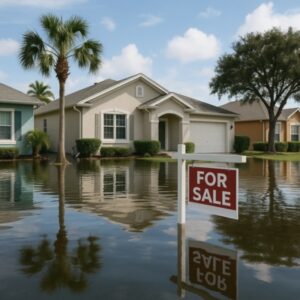Florida Enacts New Flood Disclosure Requirements for Residential Real Estate Transactions
 By: Alessandro Secino, Esq.
By: Alessandro Secino, Esq.
During the 2025 Florida legislative session, the Florida legislature passed Senate Bill No. 948 which introduces new flood disclosure requirements for residential property transactions. As many in the industry are already aware, last year the Florida legislature introduced flood disclosure requirements for sellers of residential real estate. This new law expands the disclosure requirements to now include landlords, condominium associations and mobile home parks. Below is what you need to know.
Who Must Provide Flood Disclosures?
- Residential Landlords. Landlords entering into lease agreements on or after October 1, 2025, with lease terms one-year or longer must now provide a separate flood disclosure form to tenants before or at the time of lease signing. This form must disclose whether the property has previously flooded during their ownership of the property, whether the landlord has filed insurance claims related to flood damage, and whether they’ve received assistance (such as FEMA funds) arising from flood damage.
- Sellers of Residential Real Estate. The law also slightly amends Section 689.302, Florida Statutes, to now require sellers to disclose whether they have any knowledge of flooding that has occurred during Seller’s ownership of the property and expands the assistance disclosure to include all assistance regardless if coming from the state or federal government.
- Developers of Condominium and Cooperative Units. Sections 718.503 and 719.503 have been revised to require developers to include flood disclosures in contracts for sale or long-term leases (five years or more). These disclosures must be prominent in the contract documents and contain the same core flood risk information.
- Mobile Home Park Owners. A new subsection in Section 723.011 requires park owners to provide flood disclosures to prospective lessees of mobile home lots before the lease is executed or occupancy occurs, whichever comes first.
What the Law Requires You to Disclose
Each disclosure form must clearly define “flooding” and ask whether, during ownership, the disclosing party:
- Has knowledge of any flooding that has damaged the property
- Has filed any flood-related insurance claims, including but not limited to, claims with the National Flood Insurance Program.
- Has received assistance for flood damage, including but not limited to, assistance from the Federal Emergency Management Agency.
Each disclosure must also note that standard homeowners’ and renters’ insurance policies do not include flood coverage and recommend that buyers or tenants speak with their insurance agent about purchasing separate flood insurance.
What Happens If There’s a Violation
If a required disclosure is not provided and the property floods, the impacted tenant or buyer may have certain legal remedies:
- Tenants may terminate their lease and seek a refund of all prepaid rent and deposits for periods after termination of the lease if their personal property suffered “substantial loss”—defined as 50% or more of the item’s market value.
- Mobile home lessees have similar rights and may cancel their lease under the same standard.
- While the law does not expressly create a private right of action for buyers, failure to disclose may open the door to claims of misrepresentation or contract disputes in residential sales. This may seem contrary for some as many properties within Florida are clearly located in areas with increased flood risk, however to avoid potential causes of action Sellers should disclose any flood history that they are aware of even if it did not occur during their ownership.
Why It Matters
This law now places an affirmative obligation on multiple types of property owners to disclose known flood risks to potential tenants and buyers. As mentioned above, failure to provide the necessary disclosure may result in potential negative impacts for landlords, sellers and developers should flooding occur on their property. Property owners need to be aware of these new requirements and modify their form contracts and/or prepare the necessary disclosure forms prior to signing any new agreements after October 1, 2025. Compliance with these new requirements will help mitigate avoidable legal headaches when flood damage occurs, and allow property owners to focus on restoring their properties rather than focus on potential legal ramifications.
Bottom Line
As discussed above, effective October 1, 2025, Florida law will now expand existing flood disclosure requirements to include residential landlords, condominium developers and mobile home parks. While the changes in the law do place an increased burden on property owners, the disclosure forms are already widely available to real estate professionals and the required disclosure language for each property type is already included in the relevant statutory sections.
If you have questions about complying with the new flood disclosure requirements, please don’t hesitate to contact me at alessandro.secino@henlaw.com.

